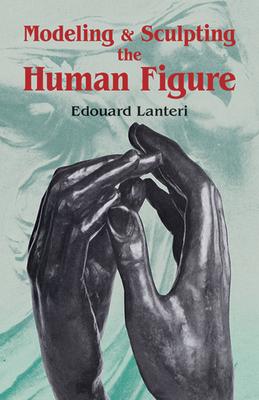Is there art after modernism? Many of today's art students and professionals are finding the answer -- yes -- lies in the long-neglected field of figurative sculpture, a demanding form of expression that requires extremely rigorous technical training. Most modern schools, however, are simply not equipped to provide the necessary technical background. The republication of this highly valuable text by Edouard Lanteri, renowned teacher, sculptor, and intimate friend of Rodin (Rodin called him my dear master, my dear friend), makes it possible for serious students to gain the requisite skills and bridge the gap between artistic concept and figurative realization. Representing at least three thousand years of studio lore, this readily understandable, authoritative guide is a goldmine of technical information, easily comprising a four-year sculpture curriculum unavailable elsewhere.
Beginning with a detailed study of modelling a head from a cast model, Lanteri gives meticulous descriptions of the anatomical features that comprise the head. Next, there are instructions for sculpting a bust from a live model: how to place the model, use the clay, take measurements, set up the all-important framework, put on hair, etc. The author also covers modelling the figure from nature, including such factors as the scale of proportions, posing the model, the chief line, contrasts of line, building up the figure, and more.
Part III covers sculpting in relief (poses, fixing the background, tools, superposition of planes, color, change of light, etc.); drapery (arrangement of folds, principles of radiation, flying drapery, etc.); and medals (proportion, working the mold, inscriptions, etc.). Also discussed are principles of composition, both in relief and in the round. Profusely illustrated with hundreds of photographs, drawings, and diagrams, this work is the kind of comprehensive resource that should be a lifelong studio companion to the figure sculptor. 107 full-page photographic plates, 27 other photographs, 175 drawings and diagrams.

Is there art after modernism? Many of today's art students and professionals are finding the answer -- yes -- lies in the long-neglected field of figurative sculpture, a demanding form of expression that requires extremely rigorous technical training. Most modern schools, however, are simply not equipped to provide the necessary technical background. The republication of this highly valuable text by Edouard Lanteri, renowned teacher, sculptor, and intimate friend of Rodin (Rodin called him my dear master, my dear friend), makes it possible for serious students to gain the requisite skills and bridge the gap between artistic concept and figurative realization. Representing at least three thousand years of studio lore, this readily understandable, authoritative guide is a goldmine of technical information, easily comprising a four-year sculpture curriculum unavailable elsewhere.
Beginning with a detailed study of modelling a head from a cast model, Lanteri gives meticulous descriptions of the anatomical features that comprise the head. Next, there are instructions for sculpting a bust from a live model: how to place the model, use the clay, take measurements, set up the all-important framework, put on hair, etc. The author also covers modelling the figure from nature, including such factors as the scale of proportions, posing the model, the chief line, contrasts of line, building up the figure, and more.
Part III covers sculpting in relief (poses, fixing the background, tools, superposition of planes, color, change of light, etc.); drapery (arrangement of folds, principles of radiation, flying drapery, etc.); and medals (proportion, working the mold, inscriptions, etc.). Also discussed are principles of composition, both in relief and in the round. Profusely illustrated with hundreds of photographs, drawings, and diagrams, this work is the kind of comprehensive resource that should be a lifelong studio companion to the figure sculptor. 107 full-page photographic plates, 27 other photographs, 175 drawings and diagrams.